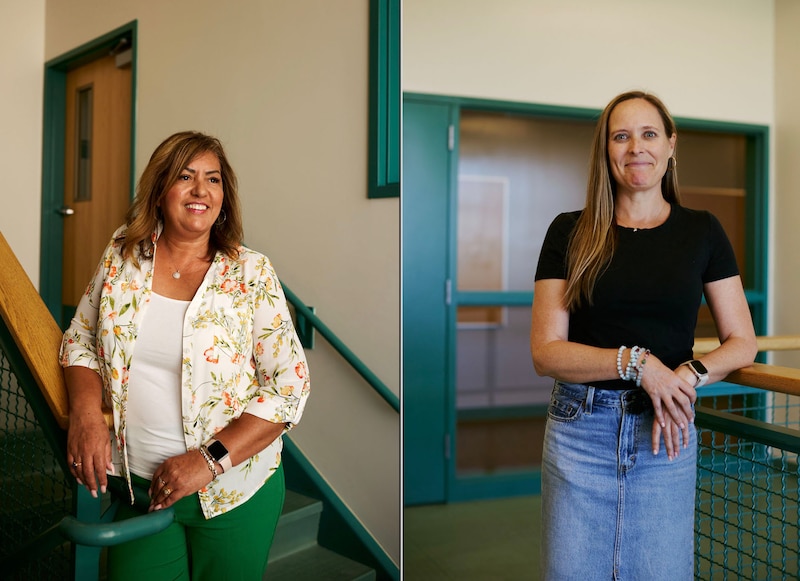During the last week of summer school in Westminster, about 19 kids practiced forming English sentences that described pictures displayed on a smartboard at the front of the class.
“I see kids playing fútbol,” one child, Mathias, said about a photo of a group of older kids playing soccer in the rain.
But teacher Sydney Pollock wanted the class of third through fifth graders to practice starting sentences with the words “This” or “That,” and to use a singular verb in the sentence. She reminded Mathias that “kids” is plural. Writing the word on the board, she asked the class how to make it singular. Drop the “S”, kids said.
Mathias tried again. “This kid playing…”
Don’t forget your verb, Pollock reminded him, pointing to examples on the whiteboard.
“This kid is playing fútbol,” Mathias said, excited to get it right.
Westminster Public Schools was one of many districts in Colorado to receive a surge of new immigrant students after the start of the school year. In the four months between October and February alone, the district reported it had enrolled 216 newcomer students. Westminster received $877,000 in one-time state funding to help cover the expenses of educating students who were not counted for this year’s state funding because they started after October.
With that help, Westminster budgeted $10,000 to create a new summer school program to help Spanish-speaking students keep practicing English, particularly hoping to enroll many of the new immigrant students who had just started to learn.
The summer program enrolled 135 students in kindergarten through 11th grade. Kate Herter, who served this summer as the program’s principal, said she estimated about 85% of the students enrolled were new to the country this year.
Herter said the goal is for students to have a space where they can feel more comfortable practicing their English skills, so that they might feel more confident participating in their learning next school year.
When kids began the summer program, they started learning how to talk about food. Another week was spent learning about money and how to count U.S. dollars. Next door to Pollock’s class, another group of students was learning how to form sentences in English to describe the different seasons, making observations about the cold, the rain, and the leaves.
“We’re really trying to target language that they can use immediately inside the community,” Herter said.

Susana Zubia López was one of the family liaisons who helped the district call all newcomer families to invite them to enroll their children.
She said most families were excited about the opportunity to have their children keep learning English.
Zubia López said that of the new immigrant families she was in touch with, the only ones who didn’t enroll their children were families who were moving or who said they were taking a trip.
The district provided free transportation to the four-hour daily program, as well as breakfast and lunch just before students went home at noon. The students in the program were also able to get vaccinations to be ready for school enrollment this fall.
“We didn’t want a gap,” Zubia López said. “Our goal was to not have that big a gap.”
In 2018, Westminster had signed an agreement with the federal government to make changes to how it identified and served students who were learning English as a new language after the Department of Justice found that the district may have been under-identifying students and not providing them with enough resources. The district started making changes as the pandemic began.
In the summer of 2021, Westminster also used COVID relief funds to extend the school year an extra 12 days to give students more opportunities to learn. But this is the first year, district leaders said, that the district had a targeted summer program for students learning English.
Herter said teachers are regularly collecting data and will be evaluating if students demonstrate improvement in their English development next year.
For now, teachers also worked on making students feel more comfortable. In Pollock’s class, one girl spelled out a sentence about the picture she observed, but initially pleaded with the teacher who had come around to her table not to make her try to say it out loud.
Next door, when students were learning about the seasons, teacher SanJuanita Carbajal had the students watch an animated video with a catchy song about the seasons. At first, the students were not singing along. But after a few minutes, they joined in.
Sara Gonzalez, who teaches first and second graders in the program, said that students know she speaks Spanish and started the program trying speaking to her mostly in Spanish.
She often tells them she doesn’t understand in an effort to have them practice their English. Now, she said, she is seeing them try to speak more in English.
“We know they’ll feel more confident in their learning later,” Herter said.
Yesenia Robles is a reporter for Chalkbeat Colorado covering K-12 school districts and multilingual education. Contact Yesenia at yrobles@chalkbeat.org.
